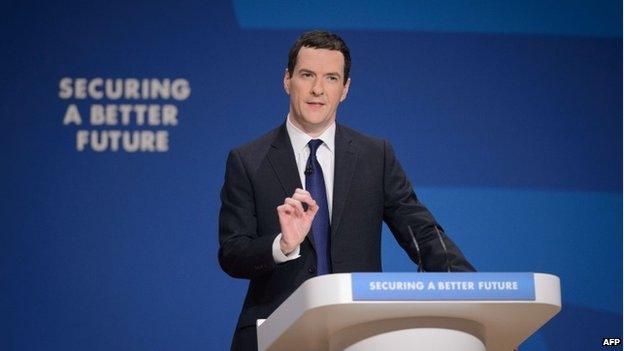Is Osborne right that a smaller state means a richer UK?
- Published
- comments

What mattered about George Osborne's speech today was its confirmation that voters face a significant economic and social choice at the next general election.
If the UK's relationship with the European Union does not drown out everything else, it is the size of the state - and especially the scale of subsidies for out-of-work and low-income families - which will be the main battleground.
This will be a choice about how much public spending should be reduced after May 2015, about whether taxes should rise, and about whether benefits for working age people should be increased or frozen.
Underlying these choices, as I mentioned last week when Ed Balls outlined his plans to Labour's conference, is a significant difference between the two big parties' plans to eliminate the deficit: the Tories want a surplus on all government spending, including investment, by 2018/19; Labour is aiming to balance the current budget, excluding investment, by 2020.
That difference means a Tory government would have to find £28.3bn more of spending cuts or tax rises than Labour, according to the Institute for Fiscal Studies.
George Osborne talked about a different number today (which he has mentioned before), which is his aim to find £25bn in savings over the first two years of a new government.
Of that he said £13bn would come from continuing to cut ministerial budgets - a continuation, broadly, of the rate of cuts they have incurred in this parliament.
The rest, he hopes, can come from welfare savings, in that he said explicitly that he does not want to raise taxes if can possibly help it.
Welfare savings
Here there is a big difference with Labour.
George Osborne made what he thinks of as a down payment on those welfare savings, by announcing a two-year freeze on benefits from April 2016, to save £3.2bn a year by 2017/18.
Pensioners and disabled people will be excluded from the freeze.
But there would be a real fall in the income (that is adjusted for inflation) of many millions of working-age people.
Some would say if there is to be such a squeeze, it is unfair that pensioners should be excluded, in that what they've received from the state over the course of this parliament has risen faster than that received by working age people.
Is this protection simply so as not to alienate a demographic that is essential to a Tory victory?
Some will certainly assume that is the case - although the Tory bit of the coalition Treasury tells me that the reason for protecting pensioners is that the government does not expect those who have retired to go out and find a job to enhance their living standards.
Hmmm: looking at those manning the tills or stocking the shelves of supermarkets shows quite a few pensioners back in work
By contrast to the Tory £3.2bn welfare cut, Labour's Ed Balls announced a saving of somewhere over £100m a year from limiting the increase in child benefit to 1% a year for two years.
And he is committed to reintroducing a 50p top rate of tax, and to reversing the last of the current government's planned reduction in corporation tax.
Or to put it another way, Labour would cut less and tax more, to reduce the deficit by less.
Equitable society?
Voters therefore have to decide whether shrinking the state faster and more, as the Tories want, will provide a firmer foundation for long term wealth creation, or risks undermining the recovery we are currently enjoying and taking precious cash from the vulnerable.
So in that sense, this general election will be properly about the nature of the society and economy we regard as equitable and sustainable.
But it is important not to assume this is about the Tories siding with the private sector and big businesses while Labour is simply on the side of ordinary people.
The distinctions are less sharply delineated that that.
For example Labour's more sympathetic approach to the European Union tends to be preferred by big companies.
And George Osborne today made a significant announcement that he would take steps in the forthcoming Autumn Statement to prevent big multinational tech companies, such as Google, paying little or no corporation tax in the UK, by employing artificial devices to shunt UK revenues to overseas tax havens.
The immediate reform will be to empower HMRC to "see through" such tax avoidance schemes to impute revenues to the UK.
I am told this will extract hundreds of millions of pounds of additional tax every year more-or-less immediately from the likes of Google.
'Modern scroungers'
But there is a big prize, of billions of pounds of additional tax to be taken from multinational companies, by implementing an expected new international deal - being negotiated by the G20 group of big economies and the OECD group of rich nations - to restrict what is known as "base erosion and profit shifting".
The Treasury believes these billions will be available to the UK relatively soon.
And on this element of tax policy, Tories and Labour are united: they both regard giant tax avoiding businesses as thoroughly modern scroungers.
What mattered about George Osborne's speech today was its confirmation that voters face a significant economic and social choice at the next general election.
PS: Given that the Westminster government is committed to give control over welfare spending to the Scottish government, presumably it could decide not to implement the two-year freeze on benefits for those of working age.